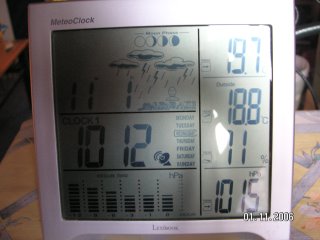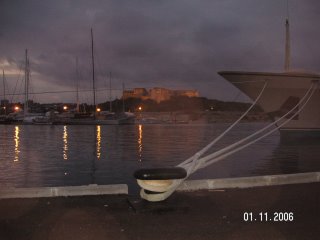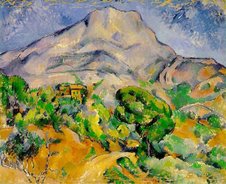 What you see on the right is one of those gizmos that I personally had not come across till recently. It's a meteo clock, and sits on our coffee table, and despite its intimidating array of symbols and flashing numbers has proved quite a talking point. One visitor was curious to know how it was able to display the outside as well as inside temperature, and liked the way the display alternated between showing the humidity as well as temperature. Certainly anyone who knows this part of the world will understand that the humidity figure is every bit as important, if not more so, than temperature.
What you see on the right is one of those gizmos that I personally had not come across till recently. It's a meteo clock, and sits on our coffee table, and despite its intimidating array of symbols and flashing numbers has proved quite a talking point. One visitor was curious to know how it was able to display the outside as well as inside temperature, and liked the way the display alternated between showing the humidity as well as temperature. Certainly anyone who knows this part of the world will understand that the humidity figure is every bit as important, if not more so, than temperature.
I took the photo yesterday morning, because the meteo was warning of approaching rain, indeed an electrical storm. Out the window, things looked reasonably settled - a hazy blue sky- so I was curious to see how things developed. Was our meteoclock a good buy ? I'll say later why I have no faith whatsoever in the local published forecasts.
How does the meteo "know" what the weather going to be like ? Well, according to the book of words, it monitors atmospheric pressure, temperature, humidity, and if there's a sudden change in any of these quantities , it makes a prediction based on the size and direction of the change.
If you look at the bottom of the display, for example, you'll see a bar chart displaying atmospheric pressure on a time scale ( -12, 9,-6,-3,-1, 0 hours) reading left to right. You can see that the pressure had been dropping steadily for the last 12 hours, signalling the arrival of a depression and with it a rainy spell . How does it know the outside conditions ? There's a separate unit, the size of a remote control, that sits on a window sill, recording temp and humidity, and communicating these to the main unit at 1 minute intervals via radio signals.
Speaking of radio, you may also note the dish antenna symbol. That shows that the clock is picking up a signal from Hamburg that automatically corrects the time. I was hugely impressed last weekend to see it put the clock back an hour, even if the change was a few hours late on the display. It beats having to dig out the book of words, and fiddle around with buttons.
Well, as the day went on, so the clouds got bigger and darker. And here's how it looked down in the harbour last night, just before nightfall. Threatening !
Finally, at about 11pm , there were a few drops of rain. So the meteo clock worked, after a fashion. Obviously one cannot set too much store by a single snapshot, so to speak, - but as I indicated earlier, it beats the local forecast anyday.
In case you weren't aware the French Riviera enjoys a microclimate that it doesn't really "deserve" based on latitude alone. There are parts of the coast here, especially between Monaco and the Italian border, where virtually anything can be grown outdoors, with perhaps just a little extra protection in winter. I'd never seen a jacaranda tree outside of Kew Gardens till coming to this part of the world. If you're into gardening, or botanically inclined, the Hanbury Gardens just across the border are a must.
It's reckoned that to get our winter climate in the leg of Italy (ie not counting the western Italian Riviera) , you'd have to travel down to Naples and beyond . Why is that? I don't pretend to know all the answers, but it's a combination of factors. First, the topography - with hills and mountains forming a backdrop, it's protected from the cold north winds, especially the dreaded mistral that can makes life such a misery further west ( see Peter Mayle's descriptions of the Luberon in his "Year in Provence" - quite shiver-inducing, just to read). I'm told that sea currents, prevailing winds are also part of the equation.
But just as the Riviera is a microclimate, so there are nano and pico climates within. There are many days when Antibes has quite different weather from Nice, a mere 15 miles across the bay. I know because I have only to look across, and see Nice under cloud and rain for hours on end, while we're in clear sunshine . Naturally there are days when it works the other way.
We've given up consulting our ISP's online weather forecast, with Nice as the nearest town. Most of the time it's a joke. Sure it gets it right sometimes. But then a stopped clock is right twice a day. The forecast in the local paper is no better. Thus the decision to invest in a Meteo clock.
I'm writing this pretty much as it comes, with little attempt at tarting up, or adding literary flourishes. And I'm not going back, trying to condense into fewer words, because I don't have an editor and a strict word limit. Does anyone reading this object to a relaxed style of writing ? I only mention it because "Anonymous" has popped up on Colin Randall's Salut! blog, describing my blog as "verbal diarrhoea". I always feel that expression to be somewhat ambiguous: is it an indication of quantity, quality or both ? If readers here would prefer a tighter writing style - probably with less frequent postings as a consequence- please say so in the Comments. It was GBS who once apologized, I believe, for writing a long letter, saying he did not have the time to write a shorter one !
Whether I act on advice is another matter. Much would depend on the manner and spirit in which it was given. "Anonymous" does not strike me as someone who's well-disposed - possibly one of the two or three long-term residents on that site - carnivores who delight in shredding other's comments and opinions.
As I see it, a blog is not like a TV channel that exists to entertain anyone who casually tunes in. It's one's personal space - a niche if you like- that may take weeks or months to establish itself, and attract a small group of kindred spirits, or those who simply want to see how the world looks through the eyes of someone other than themselves.
Final thought. I was once called on to teach "Weather" as part of the Science National Curriculum. Neither I nor my colleagues greatly relished the task: it's too nebulous and wishy-washy for the scientific temperament. But there's one useful thing I learned that sticks in the memory. It's how to answer the question "What causes weather ?" in just seven words. Anyone know the answer ?
Thursday, November 02, 2006
Dull day in Antibes
Subscribe to:
Post Comments (Atom)








No comments:
Post a Comment